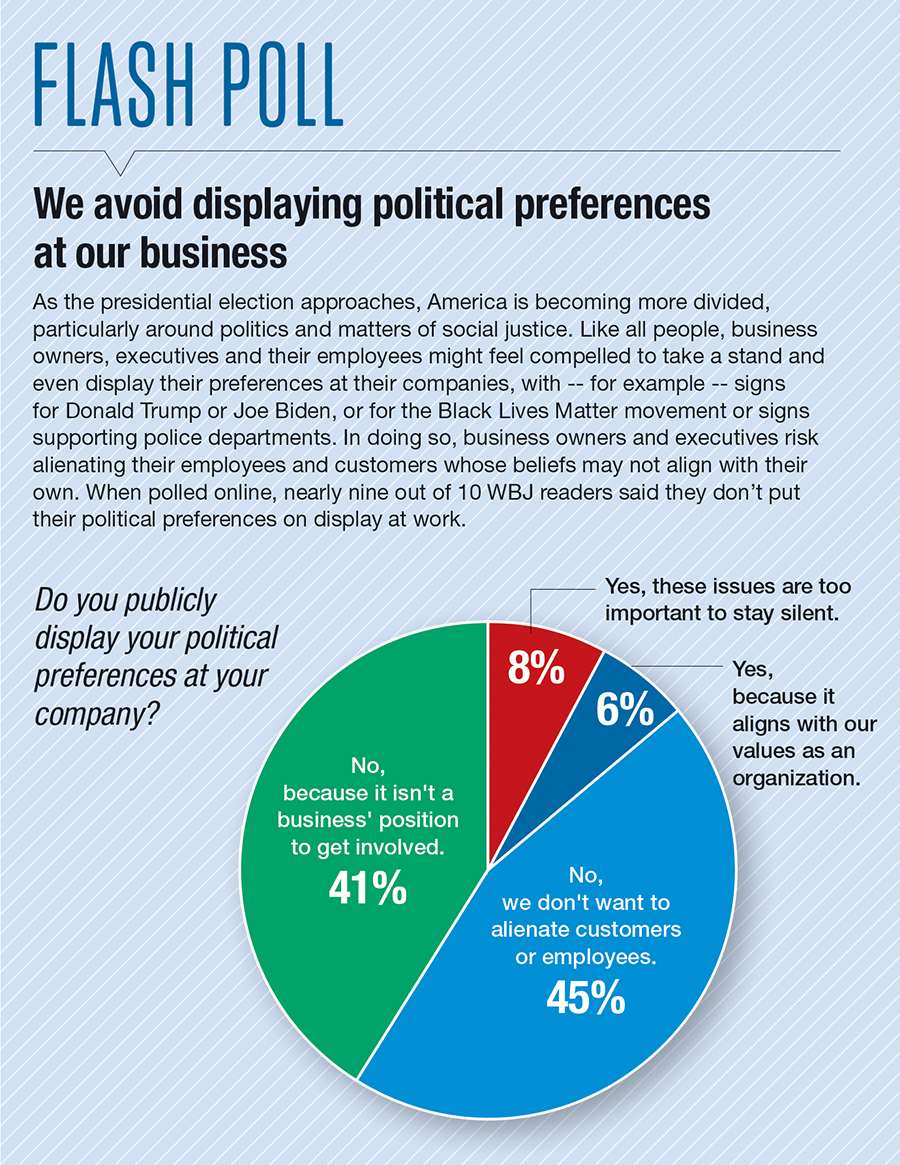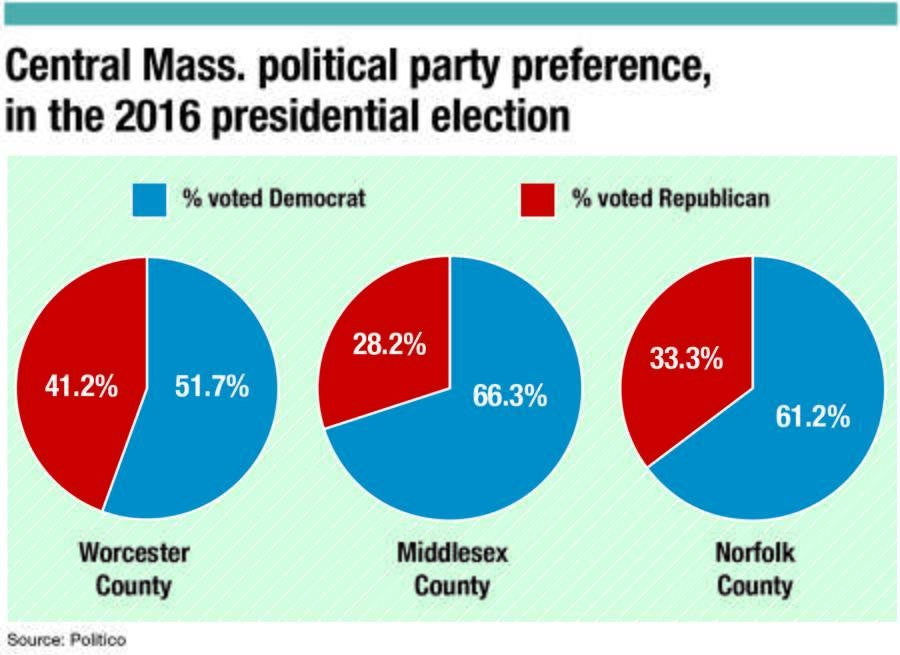
Should brands have political opinions? Experts weigh in
 DREAMSTIME.COM
DREAMSTIME.COM
Between the upcoming presidential election on Nov. 3, fiercely divisive debates around social issues, and the governmental response to the coronavirus pandemic, strong opinions are everywhere. As community members with sometimes significant audiences, should brands and companies join the fray?
According to a handful of marketing, communications and public relations firms doing business in Central Massachusetts, that depends largely on what your business does and who it serves, as well as a brand manager’s end goal.
“At the end of the day, all we're trying to do is relate and persuade a target audience. So you better know who you are, you better know what your audience wants because you can miss the mark,” said Michael Donovan, chief strategist and creative director at Metaphor, a digital advertising and marketing agency in Worcester.

Donovan, like others interviewed for this story, said he tends to distinguish between political and social issues, especially when it comes to brand alignment. This is particularly true with companies working in Central Massachusetts, where a client’s political persuasion may be more difficult to guess.
“Social and political are close, but you'll see much more social [alignment] locally than political, because most businesses in this region want to do business with both sides of the aisle,” Donovan said. “So they avoid partisanship.”
Considering employees
Aligning one’s brand politically, or socio-politically, can come in many forms.
A messaging campaign may be as straightforward as putting together a press release, or as complicated as a multi-platform marketing campaign.
But while it’s easy to focus attention outwardly, external audiences aren’t the only ones to consider, especially when endorsing a social issue or political opinion. This is particularly true if a brand or company doesn’t work in a field directly related to the issue at hand, said Jim McManus, principal at Slowey McManus Communications, which has offices in Worcester.
McManus pointed to the resurgence in Black Lives Matter protests over the summer, when many business owners felt compelled to weigh in on police misconduct against Black people. When fielding client concerns, McManus said he focused on who such statements would actually be serving.
“Most of them, I didn't think had anything terribly valuable to say because they were not in the criminal justice field,” McManus said. “And so I could kind of steer them to focus on internal audiences, their employees who are upset and want to do something. And, you know, that was, I think, that's the way to go. Sometimes, people should focus on their employees.”
But it’s not necessarily just a matter of whether a company has something productive to contribute to a political, social, or politically social issue, said Kathleen Pagano, CEO of Pagano Media in Worcester. It’s also a matter of respecting who your employees are and what they value, and how that correlates with the messaging a brand projects.
“For those that it's applicable for political causes, we recommend that they don't take a position because businesses and organizations are comprised of individuals,” Pagano said. “And each of those individuals has the right to their own political view, which should be respected.”

Social issues vs. political issues
Although many social issues carry a political connotation, especially in 2020, the four marketing professionals interviewed for this story broadly agreed endorsing a social cause is a much safer business decision than endorsing a political one, especially if that social issue is related to the sector a company works within.
“We always say it depends,” Pagano said. “We recommend getting involved if the social issue is related to the mission and the values of the brand.”
For example, she said, if you’re an athletic and apparel company like Patagonia, a major brand known for its corporate social responsibility work, it could make sense to align yourself with causes like healthy eating, fighting childhood obesity, exercise or anything related to sustainability.
“On social causes, there is a much clearer pathway ... But where things have become so divisive, particularly on the national level of politics, we're finding that our clients have been more cautious, and again, we wouldn't advise them to take a position on that to begin with,” Pagano said.
With some issues, however, the social aspect has become inherently political, and that can make things a bit more complicated.
“My philosophy is that I don't have any desire to put a political stance on our website or in my email or anything like that, but I do believe that business leaders have a responsibility to the communities that they’re in, whether there's a local community or a worldwide community like ours, to take a stand on social justice,” said Stephen Schuster, CEO of Rainier Communications, in Westborough.
Rainier said when Black Lives Matter picked up steam, for example, he put together a YouTube video, blog post and unique email signature signalling his support for the movement. He posted a sticker outside of Rainier headquarters reading “All are welcome here.”
While it may be difficult to separate politics from social justice movements, he said, sometimes businesses have an ethical obligation to signal support.

“Those are basic human social justice issues that I think it's not only okay, but is incumbent upon business leaders to embrace,” Schuster said.
Be authentic
Once a brand has considered their target audience, analyzed whether a movement or political persuasion is aligned with their mission and values, and accepted that they may well lose support from customers that don’t support them, there’s one more key question to answer: Is this alignment authentic?
In other words, can a company walk the walk?
“The last thing you want to do is find out that, for example, if your company or organization wants to speak out about climate change, that there’s not something working against that message internally,” McManus said.
Although authenticity has become a bit of a marketing buzzword as companies strive to connect with their customer base on increasingly intimate levels, when it comes to aligning a company with a cause, it’s a fairly straightforward concept.
“Just be genuine, be consistent and be careful,” he said.
Donovan echoed similar advice, cautioning companies from taking advantage of a hot-button issue just to gain traction on social media.
“It can backfire on you, well intentioned as it is, to jump on the latest news cycle,” Donovan said.
When it comes to making statements, he pointed to age old advice: “Tread carefully.”









0 Comments